10th Conference of Parties to the Convention on Biological Diversity (CBD COP 2010)
Photo by Ryunosuke Kikuno on Unsplash
Overview

Host: UN Convention on Biological Diversity
Location: Nagoya, Japan
Dates: October 18–29, 2010
The Convention on Biological Diversity (CBD) entered into force in 1993, a product of the 1992 UN Earth Summit. With 194 parties to it, it is one of the major international convention on the environment. Its governing body, the Conference of the Parties (COP), meets every 2 years to to review progress, identify priorities, and ratify work plans. It also provides direction to the Global Environmental Facility, the institution responsible for managing the financial mechanism of the CBD.
Every COP agenda combines updates to long-standing programs with new or extra-ordinary agenda items. COP10 was no different; in addition to updates, the COP approved a Strategic Plan for Biodiversity and Aichi Biodiversity Targets–a once in a decade decision–as well as the Nagoya Protocol for Access and Benefits Sharing–a long awaited agreement on one of the CBD’s original goals.
With funding from the US National Science Foundation, we took a group of 17 researchers to COP10, with a key goal of furthering our methodology.
Key Agenda Items
- Strategic Plan for Biodiversity, 2011-2020
- Aichi Biodiversity Targets
- The Nagoya Protocol for Access and Benefits Sharing
- Biofuels: New and Emerging Issue
- Marine Decision
The CEE Team
Team members: J. Peter Brosius, Lisa M. Campbell, Noella J. Gray, Kenneth I. MacDonald, Maggie Bourque, Catherine Corson, Juan Luis Dammert B., Eial Dujovny, Shannon M. Hagerman, Sarah Hitchner, Shannon Greenberg, Rebecca Gruby, Edward M. Maclin, Kimberly R. Marion Suiseeya, Deborah Scott, Daniel Suarez, and Rebecca Witter.
Logistical support: Edward Maclin played a critical role in coordinating travel and on-site logistics; Rebecca Gruby organized our writing retreat
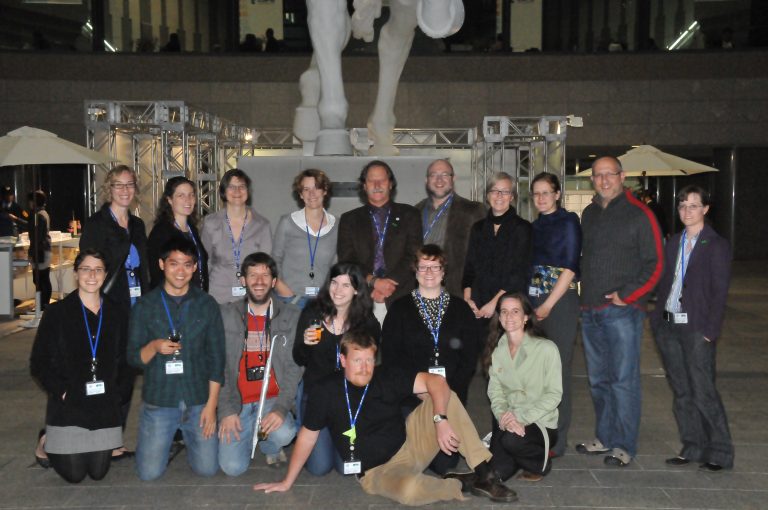


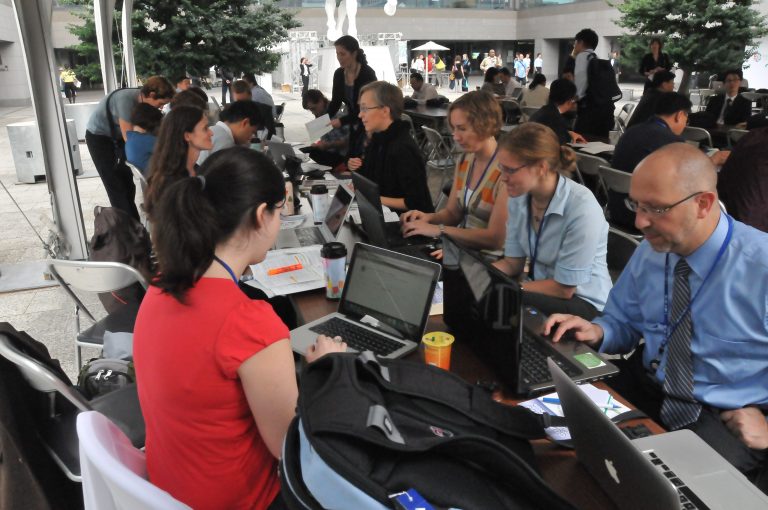
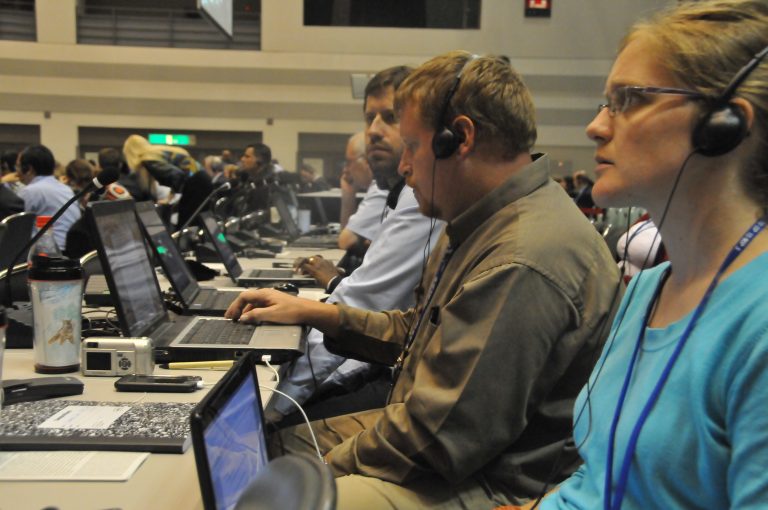
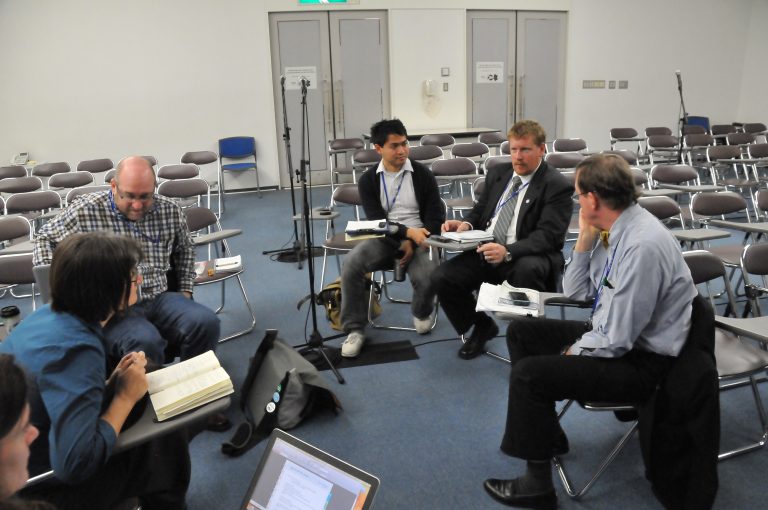
Evolving Methods
At COP10, we aimed to better capture the full benefits of collaboration. We enhanced collaboration by:
- articulating shared research questions around the politics of scale, translation, and performance
- organizing in smaller sub-groups in a matrix of ‘themes’ and ‘topics’, with each researcher joining up to 3 groups (Figure 1)
- enhancing pre-event training, including forming and meeting in small groups
- meeting daily on-site in small groups and with the full team
- developing note taking templates, observation guides, and agreements for data sharing and authorship
- supporting collaboration after COP10, meeting virtually in small groups, and in person for a 5 day writing retreat held 8 months after the meeting
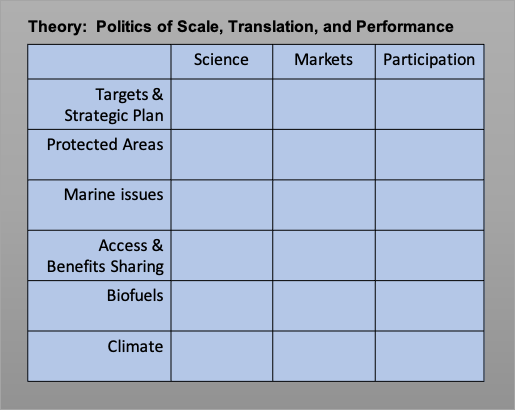
Key Collaborative Findings
Strong collaboration requires continual interaction, in order to transform “dispersed consciousness” into collective understanding
- Meetings like the COP are “field configuring events” in global environmental governance
Both formal and informal policy making-processes are important to understanding outcomes of COP10, like the Aichi Biodiversity Targets
Formal text, captured in past and present decisions, often renders political issues technical, e.g. by stabilizing contested identities and restricting sources of knowledge
- Performance can be mobilized by traditionally marginalized states and groups to assert their roles in conservation
- Campbell et al. 2014a, b; Corson et al. 2014a, b; Scott et al. 2014, Gruby and Campbell 2012
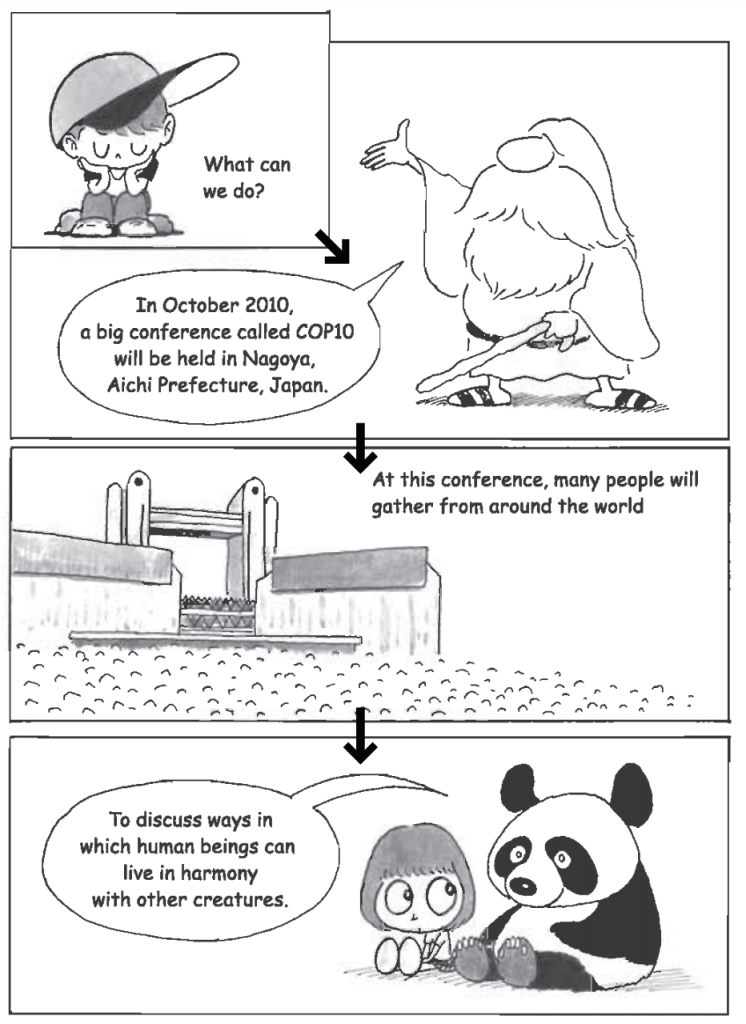
Funding
Funding for this research was provided by the US National Science Foundation (NSF) awards 1027194 and 1027201.
Celebrity
sighting
With the help of acclaimed actor Harrison Ford, Felix Finkbeiner promotes the “Stop Talking Start Planting” campaign to plant 1,000 billion trees worldwide.
IISD/Franz Dejon

Related Publications
Special Issue, Global Environmental Politics 14(3) (order of publication)
Campbell, L.M., C. Corson, N.J. Gray, K.I. MacDonald, and J.P. Brosius, 2014a. “Studying Global Environmental Meetings to Understand Global Environmental Governance: Collaborative Event Ethnography of the 10th Conference of the Parties to the Convention on Biological Diversity.” Global Environmental Politics 14 (3): 1-20.
Corson, C., L.M. Campbell, and K.I. MacDonald, 2014a. “Capturing the Personal in Politics: Ethnographies of Global Environmental Governance.” Global Environmental Politics 14 (3): 21-40.
Campbell, L.M., S. Hagerman, and N.J. Gray, 2014b. “Producing Targets for Conservation: Science and Politics at the Tenth Conference of the Parties to the Convention on Biological Diversity.” Global Environmental Politics 14 (3): 41-63.
Gray, N.J., R. Gruby, and L.M. Campbell, 2014. “Boundary Objects and Global Consensus: Scalar Narratives of Marine Conservation in the Convention on Biological Diversity.” Global Environmental Politics 14 (3): 64-83.
Scott, Deborah, Sarah Hitchner, Edward M. Maclin, and Juan Luis Dammert B., 2014. “Fuel for the Fire: Biofuels and the Problem of Translation at the Tenth Conference of the Parties to the Convention on Biological Diversity.” Global Environmental Politics 14 (3): 84-101.
Marion Suiseeya, Kimberly R. 2014. “Negotiating the Nagoya Protocol: Indigenous Demands for Justice.” Global Environmental Politics 14 (3):102-124.
Other articles (alphabetical)
Corson, C., R.L. Gruby, R. Witter, S. Hagerman, D. Suarez, S. Greenberg, M. Bourque, N.J. Gray, and L.M. Campbell, 2014b. “Everyone’s Solution? Defining and Re-Defining Protected Areas in the Convention on Biological Diversity.” Conservation and Society 12 (2): 71-83. [OPEN ACCESS]
Gruby, R.L., and L.M. Campbell, 2013. “Scalar Politics and the Region: Strategies for Transcending Pacific Island Smallness on a Global Environmental Governance Stage.” Environment and Planning A 45 (9): 2046-2063.
Hagerman, S., Rebecca Witter, Catherine Corson, Edward M. Maclin, Daniel Suarez, Maggie Bourque, and Lisa M. Campbell, 2012. “On the Coattails of Climate? Biodiversity Conservation and the Utility of a Warming Earth.” Global Environmental Change 22 (3): 724-735.
Suarez, D. and C. Corson. 2013. “Seizing Center Stage: Ecosystem Services, Live, at the Convention on Biological Diversity!” Human Geography 6 (1): 64-79
Witter, Rebecca, Kimberly R. Marion Suiseeya, Rebecca L. Gruby, Sarah Hitchner, Edward M. Maclin, Maggie Bourque & J. Peter Brosius. 2015. “Moments of Influence in Global Environmental Governance.” Environmental Politics 24 (6): 894-912. [OPEN ACCESS]
